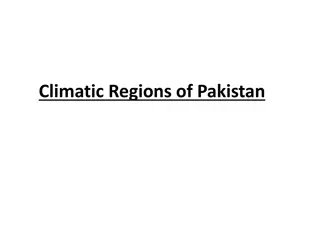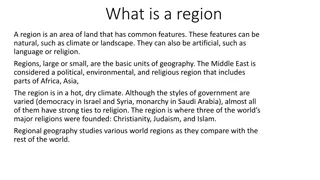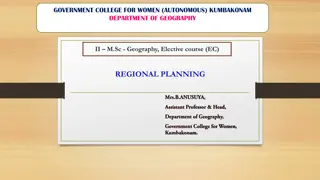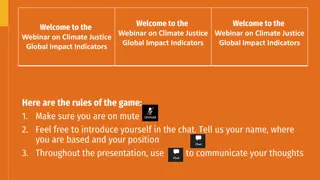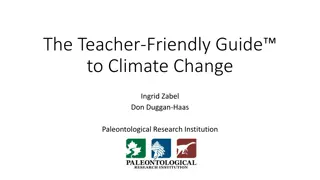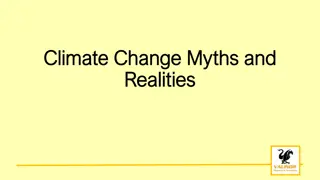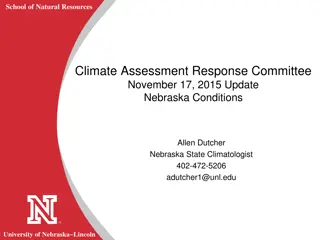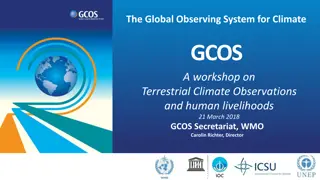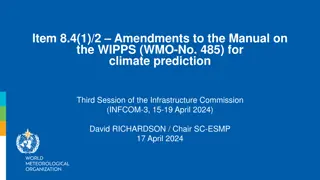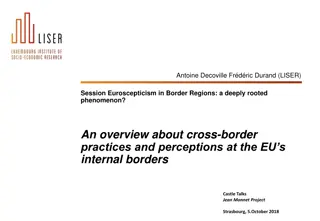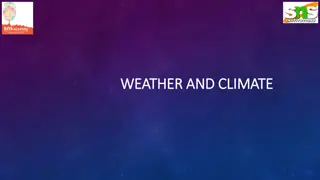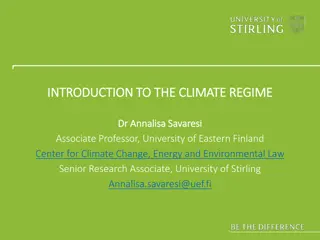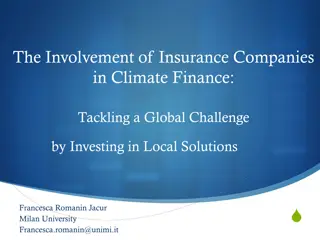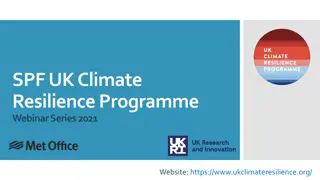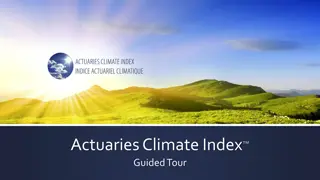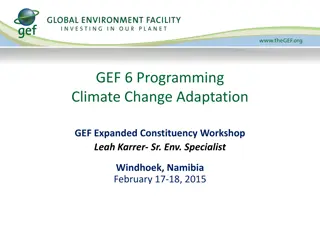Improving Health Amid Climate Change Challenges
Climate change has significant impact on health, requiring global sectors to act. Explore initiatives of the Ministry of Health in addressing climate-related health threats. Understand the interplay between climate change and health systems for a sustainable future. Learn the adverse effects of clim
4 views • 10 slides
An overview of solar influence on climate
The relationship between solar variability and Earth's climate is complex, with factors like the Sun's energy output, 11-year solar cycle, and regional differences playing a role. This overview delves into how solar influences interact with atmospheric and oceanic processes, such as the Sun's impact
6 views • 37 slides
Understanding Different Climate Types and Regions
The climate is shaped by temperature, precipitation, and wind, creating global patterns and diverse climate regions. From tropical wet climates to continental warm summers, each region has unique characteristics based on temperature and precipitation. By understanding these climate types, we can app
1 views • 7 slides
Understanding Climate Change: Weather vs. Climate, Kppen-Geiger Classification, and Major Climate Zones
Explore the distinctions between weather and climate, delve into the Kppen-Geiger Climate Classification System, and discover major climate categories such as tropical climates. Gain insights into climate change and its impact on our environment.
8 views • 11 slides
EU Global Leadership in Climate Policy - Assessment and Analysis
The European Union (EU) has been at the forefront of international climate change leadership for decades, navigating challenges and actively engaging in various climate agreements. This comprehensive assessment delves into the framework, analysis, and appraisal of EU climate leadership, highlighting
3 views • 24 slides
A Student Exploration of the Global Impacts of Climate Change on Human Health
This research delves into the effects of climate change on human health, covering how a warming climate, changes in precipitation, and increased flooding frequencies impact various health aspects such as infectious diseases, nutrition, and mental health. The study provides a visual model illustratin
5 views • 17 slides
National Climate Change Bill Overview
The National Climate Change Bill aims to establish an effective response to climate change in South Africa, promoting a transition to a low-carbon, climate-resilient economy. It focuses on coordinated actions, adaptive capacity enhancement, greenhouse gas management, and a fair global contribution.
8 views • 21 slides
Regional Climate Modeling in CORDEX South Asia for Climate Change Research
This information details the regional climate modeling efforts within the CORDEX South Asia framework, focusing on high-resolution dynamical downscaling of CMIP5 climate projections. It highlights the activities, opportunities, and challenges for assessing regional climate change, along with future
4 views • 11 slides
Investment Responses to Biophysical Climate Impacts on Water, Energy, and Land in SDGs and Climate Policies
Investment assessments using Integrated Assessment Models (IAMs) are evolving to include biophysical climate impacts, assessing climate uncertainty on investments. The approach involves the MESSAGEix-GLOBIOM IAM, considering climate policy, SDG measures, and impacts under different scenarios. Climat
6 views • 32 slides
Gender-based Climate Change Litigation: A Key Solution?
Gender-based climate change litigation is emerging as a potential solution to address the disproportionate impact of climate change on different genders. Various international bodies have recognized the importance of integrating a gender-responsive approach in climate action to uphold human rights,
4 views • 12 slides
Climate and Climatic Regions of Pakistan
Pakistan exhibits diverse climatic regions ranging from sub-tropical continental mountains to arid desert plateaus. Factors like altitude, latitude, and distance from the sea greatly influence the country's climate. The country experiences weather conditions such as temperature variations, rainfall
0 views • 14 slides
Understanding Biomes: Climate, Vegetation, and Adaptations
Biomes are vast regions defined by climate, plant and animal communities. Factors like climate, geography, and vegetation impact the unique characteristics of each biome. Understanding biomes involves knowledge of climate, geography, vegetation adaptations, and animal diversity. Changes in one part
0 views • 23 slides
Understanding Regions in Geography
Regions in geography are defined by common features such as climate, landscape, language, or religion. They serve as basic units of geography, with the Middle East being a notable example encompassing political, environmental, and religious characteristics. Regions can be classified based on physica
0 views • 10 slides
Understanding Regional Planning and Economic Regions in Geography
Regional planning involves defining regional units, planning regions, and economic regions to ensure sustainable development. It focuses on creating suitable areas for population and employment distribution. The characteristics of planning regions include resource homogeneity, internal coherence, an
0 views • 16 slides
Geography and Five Regions of Wisconsin: Key Points and Natural Features
Wisconsin's geography is influenced by the Great Lakes and the Mississippi River, affecting population distribution based on topography, soil, and climate. The state's historical reliance on soil resources for fur trade, lumber, farming, and manufacturing is evident. Varied regions like the Driftles
3 views • 9 slides
Gender and Climate Change in Agriculture: Impacts and Adaptation Strategies
This workshop explores the intersection of gender and climate change in agriculture, emphasizing the importance of considering gender dynamics in adaptation planning. It covers the effects of climate change on men and women in agriculture, reasons for gender-sensitive adaptation planning, global and
0 views • 10 slides
Regional Project Proposal to Enhance Climate Resilience in Pakistan, Mongolia, and PRC
This proposal outlines a regional project focusing on enhancing climate resilience and agricultural productivity in Pakistan, Mongolia, and the People's Republic of China (PRC). The project aims to increase access to credit for smallholder farmers, promote climate-smart agriculture technologies, and
0 views • 12 slides
Personal Rights in European Climate Litigation
Climate litigation in Europe focuses on individual rights and the shortcomings of traditional governance mechanisms in addressing climate change. The emergence of climate litigation as a crucial tool in governance is driven by the need to protect individuals and specific groups who are disproportion
0 views • 17 slides
Analyzing Systemic Climate Risk in the Financial Sector
This study discusses systemic climate risk in the financial sector by examining the effects of climate risks on financial institutions. It aims to design a market-based framework to assess the vulnerability of financial institutions to climate risks and analyze potential contagion effects. The frame
0 views • 39 slides
Climate Justice Global Impact Indicators Webinar - June 2023
Explore the Climate Justice Theory of Change, key definitions, impact indicators, and the importance of climate-relevant decision-making in this informative webinar. Gain insights on climate adaptation, resilience, and the effects of climate change, all aimed at empowering marginalized communities t
0 views • 27 slides
The Impact of Artists and Creatives in Border Regions on Culture and Economy
Artists and creatives play a crucial role in the cultural and economic landscape, particularly in border regions where diverse cultures intersect, fostering creativity and innovation. Despite facing challenges, they significantly contribute to social cohesion, the European economy, and the cultural
1 views • 21 slides
National Priorities for Climate Change Science and Knowledge in Canada
Canadians are experiencing firsthand the impacts of climate change, including wildfires, heatwaves, floods, hurricanes, and droughts. To address these challenges, foundational climate change science and knowledge are essential for understanding our changing environment, identifying impacts, making i
0 views • 9 slides
Understanding Climate and Its Impact on Earth
Exploring the fundamentals of climate, this comprehensive guide covers topics such as climate zones, climate formation, atmospheric composition, the role of CO2, ocean heat absorption, and circulation patterns. From the basics of weather and seasons to the significant impact of climate change, learn
0 views • 12 slides
The Teacher-Friendly Guide to Climate Change
The Teacher-Friendly Guide to Climate Change authored by Ingrid Zabel, Don Duggan-Haas, Robert Ross, and others explores topics such as climate measurement, natural causes of climate change, historical climate perspectives, and more. It delves into the significance of understanding past climates to
1 views • 12 slides
Climate Change Myths and Realities: Debunking Common Misconceptions
This content discusses common myths surrounding climate change and provides evidence-backed realities to debunk them. Topics include the pause in warming, natural climate variability, misconceptions about climate models, the impact of CO2 on plant life, and the consensus among climate scientists. Th
0 views • 6 slides
Climate Assessment Update: Nebraska Precipitation Trends and Impacts
Nebraska's recent climate assessment reveals varying precipitation trends across different regions. Positive short-term trends in the western part of the state indicate soil moisture recharge, while negative trends in south-central and southeast Nebraska pose challenges. A persisting dry signal for
0 views • 13 slides
The Global Observing System for Climate and Terrestrial Climate Observations
The Global Observing System for Climate (GCOS) plays a crucial role in observing climate-related variables globally. Established in April 1992, GCOS focuses on what, how, and where to measure, sustain measurement, manage change, data transmission, management, rescue, and access. It addresses concern
0 views • 17 slides
Amendments to WIPPS Manual for Climate Prediction at INFCOM-3, April 2024
The document discusses amendments to the Manual on WIPPS for climate prediction, including new recommendations for weather, climate, water, and environmental prediction activities. It introduces concepts such as Global Climate Reanalysis and the coordination of multi-model ensembles for sub-seasonal
0 views • 10 slides
Study on Climate Change and Organic Farming Impact by Madhyanchal Forum
Madhyanchal Forum conducted a study on the impact of climate change on agriculture and the effectiveness of organic farming in mitigating climate change. The study involved various organizations and farmers across different regions, focusing on the adoption of sustainable farming practices. Detailed
0 views • 16 slides
Euroscepticism in Border Regions: A Deep Dive into Cross-Border Practices and Perceptions
Explore the phenomenon of Euroscepticism in border regions, delving into cross-border practices and perceptions at the EU's internal borders. This study sheds light on how border regions emerge both functionally and institutionally, emphasizing the importance of understanding Euroscepticism in these
0 views • 16 slides
The Behavior of Spotless Active Regions During Solar Minimum
In this work presented at the SPAnet Workshop on Radio Astronomy in 2017, the study analyzed the physical parameters of spotless active regions observed during the solar minimum period from 2007 to 2010. Radio maps at 17 GHz from the Nobeyama Radioheliograph and magnetograms from the Michelson Doppl
0 views • 14 slides
Climate Change Litigation in Aotearoa/New Zealand: LCANZI Action and Judicial Review
The Lawyers for Climate Action NZ Incorporated (LCANZI) are actively involved in climate change litigation in Aotearoa/New Zealand, including challenging government decisions related to climate responses. A notable case involved a judicial review against Auckland Transport, where the High Court refu
0 views • 6 slides
Understanding Weather and Climate Factors
Weather and climate are essential aspects of understanding the Earth's atmosphere. Weather refers to short-term atmospheric conditions, while climate represents long-term averages over 30 years. Factors influencing climate include distance from the equator, altitude, proximity to the sea, wind direc
0 views • 10 slides
Understanding Weather and Climate: Factors, Zones, and Influence
The climate and weather play a crucial role in shaping the environment around us. This article explores the difference between climate and weather, the factors influencing climate, heat zones on Earth, and the influence of the distance from the equator. By understanding these concepts, we can gain i
0 views • 6 slides
Understanding the International Climate Regime and Governance
In this comprehensive overview, Dr. Annalisa Savaresi delves into the intricacies of the international climate regime, highlighting key aspects such as international climate law, major climate conferences like COP26, and the evolution of climate governance. The discussion covers important agreements
0 views • 27 slides
The Role of Insurance Companies in Climate Finance: Addressing Global Challenges through Local Investments
Exploring the engagement of insurance companies in climate finance, this presentation highlights the significance of private sector involvement in tackling climate change at a local level. It delves into key concepts such as mitigation, adaptation, and the global scientific targets for combating cli
0 views • 11 slides
UK Climate Resilience Programme Webinar Series 2021
The UK Climate Resilience Programme is hosting a webinar series featuring experts discussing climate resilience, adaptation strategies, and socio-economic pathways for the UK. Attendees can engage in presentations, Q&A sessions, and access recorded content post-event. Learn about the latest developm
0 views • 10 slides
Understanding the Actuaries Climate Index: A Comprehensive Guide
The Actuaries Climate Index (ACI) is an essential tool that measures climate risks using historical data collected since 1961. It focuses on extreme climate events and sea level changes, providing valuable insights into the impacts of climate change. By analyzing the ACI and its components, users ca
0 views • 18 slides
Climate Change Adaptation Programming Strategies and Priorities
This content discusses the Global Environment Facility's (GEF) programming for climate change adaptation, focusing on strategies, funding sources, and thematic priorities. It outlines the goals, objectives, and core pillars of adaptation programming, emphasizing the integration of climate change ada
0 views • 11 slides
Canadian Climate Change Policy from a Climate Ethics Perspective
Explore the ethical implications of Canadian climate change policy, delving into the necessity of meeting targets established in the Paris Agreement, the need for rapid decarbonization, and the availability of climate-safe energy alternatives. The presentation emphasizes the urgency of action to mit
0 views • 16 slides










